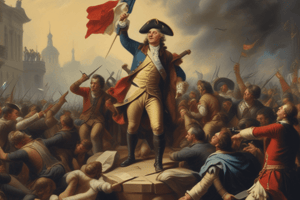Podcast
Questions and Answers
¿Cuál fue una causa financiera de la Revolución Francesa?
¿Cuál fue una causa financiera de la Revolución Francesa?
- La influencia de pensadores ilustrados como Jean-Jacques Rousseau.
- El aumento del gasto del Rey Luis XVI durante la Guerra de los Siete Años. (correct)
- La falta de representación política en la monarquía absoluta.
- El ascenso del nacionalismo en Francia.
¿Por qué creció el descontento público hacia el gobierno durante la monarquía absoluta?
¿Por qué creció el descontento público hacia el gobierno durante la monarquía absoluta?
- A raíz del aumento de la riqueza de la nobleza.
- Por la influencia de la Iglesia Católica en asuntos políticos.
- Por las reformas impulsadas por el Rey Luis XVI.
- Debido a la falta de representación política del pueblo. (correct)
¿Qué papel desempeñaron los pensadores ilustrados en el contexto de la Revolución Francesa?
¿Qué papel desempeñaron los pensadores ilustrados en el contexto de la Revolución Francesa?
- Influyeron en revolucionarios al promover derechos ciudadanos y gobierno por consentimiento. (correct)
- Apoyaron la monarquía absoluta y la autoridad del Rey.
- Promovieron la influencia de la Iglesia Católica en asuntos políticos.
- Defendieron el control extranjero sobre Francia.
¿Cuál fue un factor político que contribuyó a la Revolución Francesa?
¿Cuál fue un factor político que contribuyó a la Revolución Francesa?
¿Qué influencia tuvo el sentimiento nacionalista en el desarrollo de la Revolución Francesa?
¿Qué influencia tuvo el sentimiento nacionalista en el desarrollo de la Revolución Francesa?
¿Qué papel desempeñó la Reforma Protestante en el contexto religioso previo a la Revolución Francesa?
¿Qué papel desempeñó la Reforma Protestante en el contexto religioso previo a la Revolución Francesa?
¿Cuál fue una de las causas principales de la Revolución Francesa debido a la crisis económica que enfrentaba el país?
¿Cuál fue una de las causas principales de la Revolución Francesa debido a la crisis económica que enfrentaba el país?
¿Qué factor contribuyó en gran medida a la crisis económica de Francia debido al endeudamiento nacional causado por guerras y subsidios a aliados?
¿Qué factor contribuyó en gran medida a la crisis económica de Francia debido al endeudamiento nacional causado por guerras y subsidios a aliados?
¿Qué grupo social disfrutaba de privilegios económicos durante la Revolución Francesa, pagando solo una pequeña parte de los impuestos mientras disfrutaba de varias exenciones y privilegios?
¿Qué grupo social disfrutaba de privilegios económicos durante la Revolución Francesa, pagando solo una pequeña parte de los impuestos mientras disfrutaba de varias exenciones y privilegios?
¿Qué porcentaje del PIB francés contribuía la agricultura antes de la Revolución Francesa?
¿Qué porcentaje del PIB francés contribuía la agricultura antes de la Revolución Francesa?
¿Qué tipo de desastres naturales afectaron negativamente la productividad agrícola en Francia antes de la Revolución?
¿Qué tipo de desastres naturales afectaron negativamente la productividad agrícola en Francia antes de la Revolución?
¿Cuál era el resultado directo del aumento de los precios de los alimentos debido a la crisis agrícola en Francia antes de la Revolución?
¿Cuál era el resultado directo del aumento de los precios de los alimentos debido a la crisis agrícola en Francia antes de la Revolución?
Flashcards are hidden until you start studying
Study Notes
Introduction
The French Revolution was a period of radical social and political change within France from 1789 until 1799, which ultimately overthrew the monarchy, established a republic, led to the rise of Napoleon Bonaparte, and ended with the establishment of the Consulate in France. This revolution fundamentally changed the course of modern history. In this article, we'll explore the causes of the French Revolution.
Economic Causes
One of the primary causes of the French Revolution was the economic crisis faced by the country. Several factors contributed to this crisis:
Agricultural Crisis
France was heavily dependent on agriculture, contributing 50% of its GDP. However, there were issues with productivity due to poor farming methods, weather conditions, and natural disasters like floods and droughts that affected crop yields. As a result, food prices rose, leading to shortages and famines.
National Debt
The financial situation worsened due to the national debt, which was primarily caused by wars and subsidies given to various allies. This debt burdened the common people who had to pay heavy taxes to service it.
Nobility's Economic Privileges
Another cause of the economic crisis was the privileged position enjoyed by the nobles and clergy. They paid only a small portion of the tax revenue while enjoying various exemptions and immunities.
Financial Reasons for the Revolution
The financial crises coupled with the increased spending of King Louis XVI exacerbated the already unstable economy. He spent extravagantly during the Seven Years War without any corresponding increase in revenues. Additionally, he funded a war against revolutionary forces in Flanders despite the increasing public opposition. These escalating costs further strained the government's finances.
Political Causes
Apart from economic reasons, there were also political causes for the French Revolution:
Absolute Monarchy
The French monarchy was characterized by absolute power, where the king held complete authority without any checks from the nobility or clergy. This lack of representation led to public dissatisfaction with the government's ability to address issues like poverty, unemployment, and food crises.
Rise of Nationalism
As people started expressing their opinions through pamphlets, songs, and speeches, national sentiment began to spread throughout France. There was growing resentment against foreign influences and rulers, leading to demands for self-government and sovereignty within France.
Ideological Reasons for the Revolution
Lastly, ideological reasons played a significant role in fueling the French Revolution:
Enlightenment Thoughts
The ideas of enlightenment thinkers like Jean-Jacques Rousseau influenced many revolutionaries who saw citizenship rights, equality before law, and government by consent as inherent rights of every individual. These ideas challenged the traditional monarchical system and laid the groundwork for democratic ideals.
Religious Unrest
The French Revolution was also influenced by religious unrest. The Catholic Church had significant political influence at the time, but there were growing criticisms against its power and wealth. The Protestant Reformation had weakened Church authority across Europe, leading French citizens to demand religious freedom and secularism within their own country.
In conclusion, the causes of the French Revolution were multifaceted, involving economic crises, financial mismanagement, political oppression, nationalist sentiments, and ideological shifts. These factors combined led to widespread dissatisfaction among the population, ultimately resulting in one of history's most transformative events.
Studying That Suits You
Use AI to generate personalized quizzes and flashcards to suit your learning preferences.




